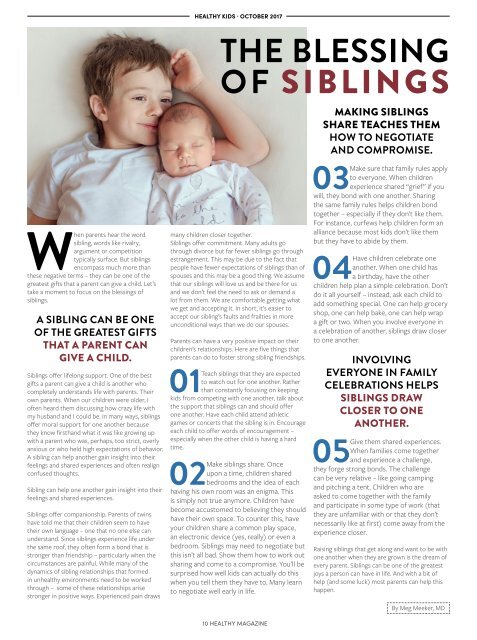Healthy RGV Issue 107 - October Has Us Thinking Pink
You also want an ePaper? Increase the reach of your titles
YUMPU automatically turns print PDFs into web optimized ePapers that Google loves.
HEALTHY KIDS · OCTOBER 2017<br />
When parents hear the word<br />
sibling, words like rivalry,<br />
argument or competition<br />
typically surface. But siblings<br />
encompass much more than<br />
these negative terms – they can be one of the<br />
greatest gifts that a parent can give a child. Let’s<br />
take a moment to focus on the blessings of<br />
siblings.<br />
A SIBLING CAN BE ONE<br />
OF THE GREATEST GIFTS<br />
THAT A PARENT CAN<br />
GIVE A CHILD.<br />
Siblings offer lifelong support. One of the best<br />
gifts a parent can give a child is another who<br />
completely understands life with parents. Their<br />
own parents. When our children were older, I<br />
often heard them discussing how crazy life with<br />
my husband and I could be. In many ways, siblings<br />
offer moral support for one another because<br />
they know firsthand what it was like growing up<br />
with a parent who was, perhaps, too strict, overly<br />
anxious or who held high expectations of behavior.<br />
A sibling can help another gain insight into their<br />
feelings and shared experiences and often realign<br />
confused thoughts.<br />
Sibling can help one another gain insight into their<br />
feelings and shared experiences.<br />
Siblings offer companionship. Parents of twins<br />
have told me that their children seem to have<br />
their own language – one that no one else can<br />
understand. Since siblings experience life under<br />
the same roof, they often form a bond that is<br />
stronger than friendship – particularly when the<br />
circumstances are painful. While many of the<br />
dynamics of sibling relationships that formed<br />
in unhealthy environments need to be worked<br />
through – some of these relationships arise<br />
stronger in positive ways. Experienced pain draws<br />
many children closer together.<br />
Siblings offer commitment. Many adults go<br />
through divorce but far fewer siblings go through<br />
estrangement. This may be due to the fact that<br />
people have fewer expectations of siblings than of<br />
spouses and this may be a good thing. We assume<br />
that our siblings will love us and be there for us<br />
and we don’t feel the need to ask or demand a<br />
lot from them. We are comfortable getting what<br />
we get and accepting it. In short, it’s easier to<br />
accept our sibling’s faults and frailties in more<br />
unconditional ways than we do our spouses.<br />
Parents can have a very positive impact on their<br />
children’s relationships. Here are five things that<br />
parents can do to foster strong sibling friendships.<br />
01<br />
Teach siblings that they are expected<br />
to watch out for one another. Rather<br />
than constantly focusing on keeping<br />
kids from competing with one another, talk about<br />
the support that siblings can and should offer<br />
one another. Have each child attend athletic<br />
games or concerts that the sibling is in. Encourage<br />
each child to offer words of encouragement –<br />
especially when the other child is having a hard<br />
time.<br />
02<br />
Make siblings share. Once<br />
upon a time, children shared<br />
bedrooms and the idea of each<br />
having his own room was an enigma. This<br />
is simply not true anymore. Children have<br />
become accustomed to believing they should<br />
have their own space. To counter this, have<br />
your children share a common play space,<br />
an electronic device (yes, really) or even a<br />
bedroom. Siblings may need to negotiate but<br />
this isn’t all bad. Show them how to work out<br />
sharing and come to a compromise. You’ll be<br />
surprised how well kids can actually do this<br />
when you tell them they have to. Many learn<br />
to negotiate well early in life.<br />
10 HEALTHY MAGAZINE<br />
MAKING SIBLINGS<br />
SHARE TEACHES THEM<br />
HOW TO NEGOTIATE<br />
AND COMPROMISE.<br />
03 experience shared “grief” if you<br />
Make sure that family rules apply<br />
to everyone. When children<br />
will, they bond with one another. Sharing<br />
the same family rules helps children bond<br />
together – especially if they don’t like them.<br />
For instance, curfews help children form an<br />
alliance because most kids don’t like them<br />
but they have to abide by them.<br />
04 a birthday, have the other<br />
Have children celebrate one<br />
another. When one child has<br />
children help plan a simple celebration. Don’t<br />
do it all yourself – instead, ask each child to<br />
add something special. One can help grocery<br />
shop, one can help bake, one can help wrap<br />
a gift or two. When you involve everyone in<br />
a celebration of another, siblings draw closer<br />
to one another.<br />
INVOLVING<br />
EVERYONE IN FAMILY<br />
CELEBRATIONS HELPS<br />
SIBLINGS DRAW<br />
CLOSER TO ONE<br />
ANOTHER.<br />
05 and experience a challenge,<br />
Give them shared experiences.<br />
When families come together<br />
they forge strong bonds. The challenge<br />
can be very relative – like going camping<br />
and pitching a tent. Children who are<br />
asked to come together with the family<br />
and participate in some type of work (that<br />
they are unfamiliar with or that they don’t<br />
necessarily like at first) come away from the<br />
experience closer.<br />
Raising siblings that get along and want to be with<br />
one another when they are grown is the dream of<br />
every parent. Siblings can be one of the greatest<br />
joys a person can have in life. And with a bit of<br />
help (and some luck) most parents can help this<br />
happen.<br />
By Meg Meeker, MD

















